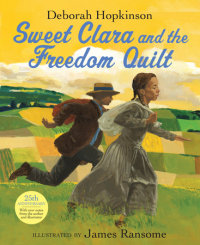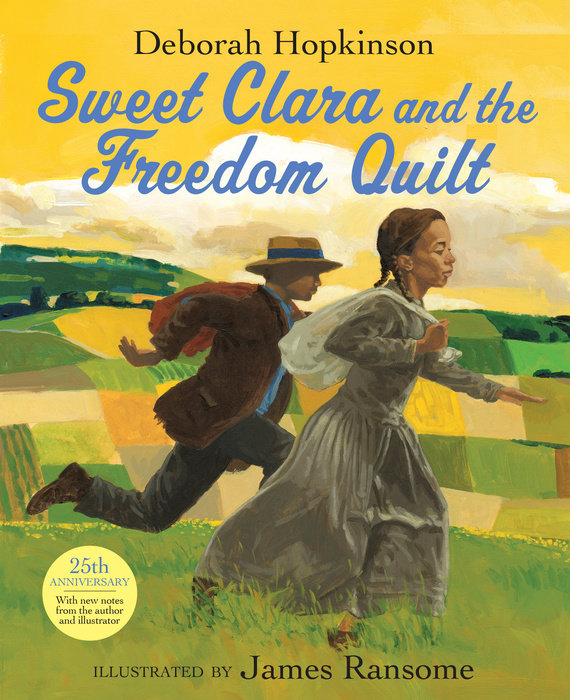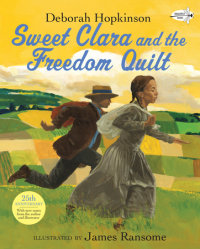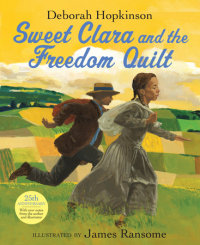Sweet Clara and the Freedom Quilt
An inspiring tale of creativity and determination on the Underground Railroad from Coretta Scott King winner James Ransome and acclaimed author Deborah Hopkinson.
Clara, a slave and seamstress on Home Plantation, dreams of freedom--not just for herself, but for her family and friends. When she overhears a conversation about the Underground Railroad, she has a flash of inspiration. Using scraps of cloth from her work in the Big House and scraps of information gathered from other slaves, she fashions a map that the master would never even recognize. . . .
From the award-winning author-illustrator team of Deborah Hopkinson and James Ransome, this fictional tale of the Underground Railroad continues to inspire young readers 25 years after its original publication.
"Inspiring." —The New York Times
"A triumph of the human spirit." —Publishers Weekly, starred review
An Excerpt fromSweet Clara and the Freedom Quilt
Chapter One
You see, but you do not observe.
--Sherlock Holmes, in “A Scandal in Bohemia”
I kept my head down as I went around the curve, hoping the pan wouldn’t fly off my head. With my right hand, I steadied my quivering spaniel and tried to keep her from toppling out of the basket. Still, even one-handed, I swear I would’ve made the turn with no problem.
Except. Except the girl was standing in the middle of Maddox Street. I shouted, “Hey, watch out!”
Too late. I had to let go of Little Roo. I grabbed both handlebars and pulled hard to the left. I wasn’t quick enough. My right pedal struck the girl’s shin; we all went down. I banged my left knee. The pan clattered away and LR tumbled out of the basket. She bounced up and began barking and twirling in circles like a crazy windup toy. Overhead, bombers roared. From the ground, ack-ack guns shot defensive fire into the sky. I scrambled to my feet, rubbing my knee.
“Are you all right?” I yelled over the din.
The girl didn’t answer at first. I reached out a hand to help her up. She pushed it away. “Why don’t you watch where you’re going?”
“Me? You were standing in the street! You’re lucky I wasn’t a bus: You would’ve been crushed flat.”
Then I stopped. Pointless. It was pointless to argue. I could tell from her accent that the girl was an American. The city was crawling with them. Soldiers in uniform, journalists, navy and army officers sporting stripes and medals, young women in crisp American Red Cross uniforms. Everyone had come to prepare for the invasion of France. It was the only way the Allies could defeat Hitler and end the war.
I knew as well as anyone that we needed the Americans, but there was a part of me that resented these strangers. They hadn’t been here during the worst of it. Three years ago, the Blitz had gone on and on. We’d lived through all-night bombing raids, incendiary bombs designed to burn London to the ground, rubble and destruction on street after street. A lot of kids had been sent to the countryside. My older brother, Will, and I had begged to stay.
The Americans hadn’t lived through that. Compared to us Londoners, they seemed to burst with hope and energy. Maybe they just ate better. They had money to eat in restaurants, where (so we heard) you could still get “real” food. They hadn’t spent years waiting in long queues, ration cards in hand, to buy food that didn’t taste much like food.
Latecomers. Too late to change what had happened to us.
Dad, as always, looked on the bright side. “We can’t achieve victory without them, Bertie,” he explained. “Britain needs American troops and trucks and tanks. We need them all. Be polite when you encounter anyone from the United States.”
And so I tried again. “Sorry I knocked you down, miss. I’m a civil defense volunteer. It’s my job to tell you to get to the shelter immediately. It’s just up the street.”
The girl snorted as she stood. She brushed off her coat. “You don’t look very official. You look like a kid. And was that a tin pan on your head?”
I felt my face burn. “I’m thirteen. It’s just . . . this is the first time I’ve been on duty during a raid and I couldn’t find--”
That was as far as I got. All at once, the night splintered apart. Whoomph. Bam!
“Get down!” I hollered. I had just enough time to grab LR and throw myself to the pavement. I curled over her warm, furry body and whispered, “It’ll be all right, girl.”
We were lucky. I felt the ground shake, but the bomb had hit nearby, most likely a block or two away. I glanced up to check on the stranger. What is she even doing out alone at dusk? I wondered. Most people headed inside on a late winter afternoon, especially now that the German bombing raids had begun again.
“Please, miss . . . it’s not safe to be out.”
The girl shot to her feet. “I’ve got to go.”
And then she was gone, flying off down the street, her dark blue coat flapping against her thin legs. Good, I thought. Maybe the noise has scared her. Maybe she’ll follow directions and get to safety.
“Go past the big church on your left,” I bellowed. “You’ll see the sign for the shelter to your right.” I couldn’t be entirely sure, but it looked as if she’d darted right past it. I shrugged. Well, she wasn’t my problem. Time to get to the command post.
LR wriggled out of my arms and started sniffing around. I went searching for the tin pan to stick back on my head. Next thing I knew, LR was at my feet, tail spinning like a propeller. Woof! Out came a muffled bark. Her little jaws were clamped onto something. “What have you got, LR? Drop it!”
I was about to reach for the object when the sound of footsteps startled me. I turned to see an older couple passing by, heading in the same direction as the girl. “Let’s go, dear,” the man called to the woman. “Almost there.”
“I’m a civil defense volunteer,” I hollered. “Take shelter now!”
“Thanks, lad, but we’re almost home,” the man said, reaching out to grab his wife’s hand. “We’ve got a Morrison shelter under our kitchen table. We’ll be safe.”
A hatless young man with short dark hair came bounding right behind them. I tried my warning again. “Get to the shelter!”
He shot me a frown. I had a quick impression of an angular face and intense, blazing eyes. He looked preoccupied, as if he had something else on his mind besides ack-ack guns. And then, like the other three, he hurried off down Maddox Street.
“I give up! No one pays me any attention,” I complained to LR, who was still wagging and waiting for me to claim what she’d discovered. I picked up a battered red notebook, small enough to fit in my trouser pocket. I slipped it in without thinking much about it, then reached out for LR.
“Now we really have to go. Back in the basket!” The wardens would be disappointed in me. Disappointing people was all I seemed to be able to do.
But LR wasn’t listening either. Nose to the ground, she raced past me, going back the way we’d come. She wasn’t going home, was she? “Oh, come on, LR! Get back here,” I snapped. “You’re going to make me lose my messenger job.”
I lunged. I missed. And LR kept going. She had a determined trot. And she was stubborn. If she wanted to listen, she listened. And if she didn’t . . .
About all I could do was chase after her short, stubby tail with its curlicue waving at the tip. It soon became clear she wasn’t heading home. She disappeared around the curve and into a small side street on the right.
LR was trained to find people in the rubble. This street hadn’t been hit, though. The blast I’d just felt had been farther away. So what was she doing? I stopped short at the entrance to the narrow alleyway. “Little Roo!”
She’d vanished into the gloom. The sky had grown darker and the night quieter. The sirens had stopped for now; the bombers had moved on, at least from this part of the city.
I’d forgotten gloves and my hands were cold. But as I stood alone in that eerie place, my palms started to feel clammy. There was an odd prickling at the base of my neck, almost as if someone was watching me. I peered over my shoulder and squinted. I couldn’t see anyone. I tried to keep breathing. In, out. In, out. It helped me stay calm. Sometimes.
If only I had my torch. Mum used to remind me about things like that. But that was before.
And then I made myself do it. I took a step into the darkness.
Chapter Two
Never trust to general impressions, my boy, but concentrate yourself upon details.
--Sherlock Holmes, in “A Case of Identity”
“LR?” I whispered, shuffling ahead a few paces. Silence. On either side, old brick buildings hemmed me in.
I noticed some “Food Waste for Pigs” bins on my left. Was LR just nosing around for crumbs? I called again. “Little Roo?”
At last I heard a faint answering whine. As my eyes adjusted to the gloom, I spotted her. She was nosing a bulky, dark shape, past the food waste bins, on the left side of the street. It wasn’t an unexploded bomb, an overturned bin, or a heap of clothes.
It was a person.
I took a shaky breath and inched forward. As I drew closer, I realized it was a young woman, lying on her side, eyes closed. Her head rested on one arm, almost as if she was asleep. Could she be asleep? One part of my brain knew that didn’t make sense. No one falls asleep on the side of the street during an air raid.



